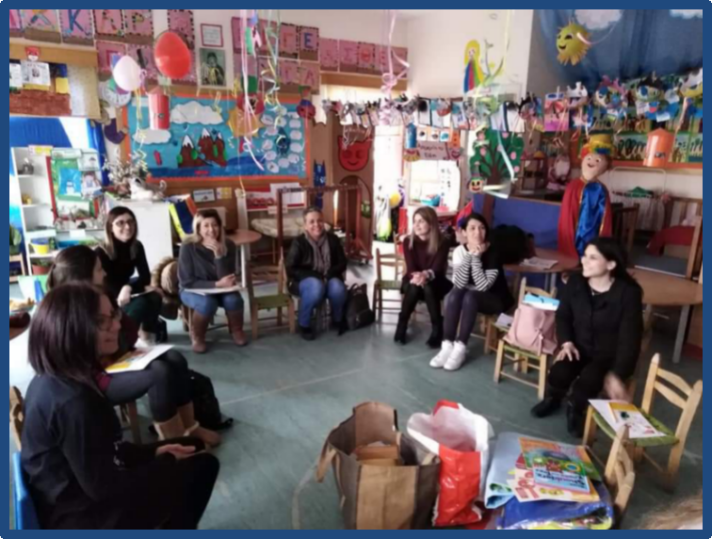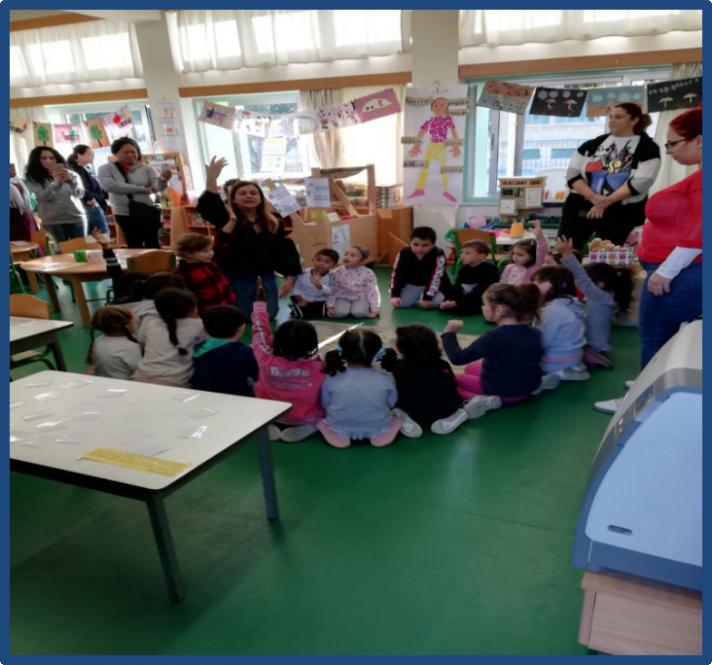Topic(s) addressed
The project’s aim was to implement an innovative approach for teaching and learning in pre-primary education; specifically, the focus was on the development of necessary competences in a select group of core pre-primary teachers who would be able to provide local capacities and a support system in the implementation, strengthening, and expansion of Content and Language Integrated Learning (CLIL). The aim of CLIL is to promote the learning of languages while the student learns about other topics/subjects, and transforms the classroom into a bilingual environment where pupils are able to freely experiment by learning and moving between languages (translanguaging). In order to achieve this outcome, both the school’s teachers and students first had to become agents of change so as to be able to successfully implement the required innovative teaching and learning approach. Participant training involved building understanding and competence in the application of techniques, strategies, and tools in the teaching of a foreign language, while promoting active, participatory learning and encouraging the development of creativity and autonomy among young children. As such, topics addressed were the implementation of innovation (new innovative curricula and education methods); the development of key competences/teaching and learning of foreign languages; improvements to teaching and learning processes; and, international cooperation, international relations, and development cooperation.
Target groups
Project participants consisted of staff from the organisation’s consortium (9 pre-primary schools and the CLIL Coordinating Centre), and also included the project’s education officers and school advisors. There were 15 core participants (9 pre-primary teachers, 4 school advisors, and 2 education officers) who linked the project to a broader group of 42 teachers and 45 education officers from various participating institutions. All participants were Cypriot nationals (between the age of 35-50) with solid backgrounds in education from across all of the country’s education districts (encompassing both rural and urban areas). While key participants differed in terms of their CLIL knowledge and teaching experience, several of them were selected for their expertise, given that they were able to function as mentors and support systems for other participants. Such individuals had an adequate understanding of CLIL, and their teaching practice indicated their potential as future mentors and trainers. Lastly, a number of individuals who were novices in CLIL also formed part of the project, with the aim of supporting said individuals in acquiring knowledge and expertise on CLIL.
Methodologies
The project focused on the implementation of CLIL as a teaching and learning approach in pre-primary education, and although CLIL was already being implemented in schools, it was still an innovative approach that had yet to be widely implemented. The project’s innovative advantage was its application of CLIL in public pre-primary education, which, at the time, was groundbreaking not only for Cyprus, but also considered to be innovative within the wider global education landscape. Through the implementation of CLIL, pre-primary schools in Cyprus have managed to introduce foreign language teaching to children as young as 3 – a significant innovation even within a European setting. Furthermore, the project’s innovative methodology allowed children to view the learning of a foreign language as a completely natural part of their daily school lives. Given that the foreign language was incorporated (using a multidisciplinary approach) into all school subjects (maths, science, physical education, music, art, etc.), children learnt intuitively, and were encouraged to experiment with the language freely and without stress or anxiety, which allowed them to develop a number of key competences, including creativity. Finally, the project’s ability to successfully implement CLIL and the learning of a foreign language at a young age (and its associated benefits), made foreign language learning an experience that was accessible to all children instead of just the privileged few. Of note was the project’s inclusion of schools that had children from migrant or lower socioeconomic backgrounds; children from such groups would not normally have had the opportunity to come into contact with a foreign language, and, as a result, this project allowed them to build confidence in their own abilities, while helping them develop positive attitudes towards other foreign languages and cultures –all of which further contributed to the success of their scholastic journey.
Environments
Within this project, schools functioned largely as enablers of innovation, and although the implementation of CLIL enjoyed support from education authorities, it was not being widely practiced in schools. Innovation does not occur through a top-down process, and this is especially evident with innovative processes such as those found in CLIL, which seeks to shift conventional teaching practices among teachers. In this regard, the project’s aim was to develop schools as ‘enablers of innovation’ towards developing bottom-up sustainable change. All participating schools developed a ‘holistic’ approach in their implementation of CLIL, with the entire school, encompassing headteachers, support staff, parents, and school inspectors, embracing the implementation of this innovative approach. Teaching staff enjoyed institutional support, and the process was explained to all parents, with activities such as team teaching, open days, and school events organised in order to celebrate successes and discuss challenges resulting from the project’s implementation. Lastly, both the project’s successes and the CLIL approach were promoted and disseminated to other schools in order to encourage change within the broader school network.
Teachers
An agent of change supports, enables, and champions change – this was the view held by teachers who participated in this project. The project itself, which viewed teachers as agents of change and innovation, aimed to bring about innovation through the participation of teachers. To this effect, the roles of teachers were manifold, including that of competence-builders, where they were trained to develop their skills and gain competence so as to help their schools develop the capacity for implementing CLIL (thus bringing about change to their schools); support-providers, where teachers were included in a network of teachers and schools towards the development of a sustainable support system that is resistant to various threats (e.g. questions and doubts by parents or colleagues, lack of materials, additional workload, etc.); trainers/material developers, where, through the appropriate use of teacher training and teaching materials, teachers were equipped to overcome obstructions to CLIL expansion; and, as disseminators, where teachers shared their personal experiences and the benefits of the approach’s implementation to teachers and parents at various conferences, school network meetings, and other parent-related events. Overall, after having developed their respective skills and competences, teachers began functioning as agents of change in bringing about change within their schools, as well as in the broader education network.
Impact
The project’s impact was most evident on the pupils and staff or participating schools, as well as among parents and the coordinating organisation’s (Ministry of Education and Culture, CLIL Centre) staff and policies. Specifically, individual teachers developed their competences and acquired new skills in teaching in a foreign language. Participating schools developed the capacity to implement an innovative approach (CLIL), while also having improved education opportunities being offered to their students, leading to improvements in their institutional profiles as schools that are innovative and modern. The project’s spillover effects was particularly significant in that both teachers and schools functioned as agents of change within their local and broader networks, which encouraged more teachers and schools to take up CLIL. As a result, the initiative to introduce CLIL in pre-primary schools has since grown to include 90 public pre-primary schools that now offer CLIL, which has resulted in improved education opportunities for students and a chance for them to learn key competences in a foreign language from a fairly young age. In sum, the project signified a sustainable change within Cyprus’ overall education system that resulted from a bottom-up process, with teachers acting as agents of change.
- Reference
- 2016-1-CY01-KA101-017274
- Project locations
- Cyprus
- Project category
- Early childhood education and care
- Project year
- 2021
Stakeholders
Participants
Nipiagogeio Psimolofou
- Address
- Cyprus
Nipiagogeio Lakatameias 1
- Address
- Cyprus
Nipiagogeio Klirou; Nipiagogeio Athienou
- Address
- Cyprus
Nipiagogeio Liopetriou
- Address
- Cyprus
Nipiagogeio Deryneias 2
- Address
- Cyprus
Nipiagogeio Pafou 1
- Address
- Cyprus
Nipiagogeio Chryseleousas
- Address
- Cyprus
Nipiagogeio Lemesou 7 Apostolou Antrea
- Address
- Cyprus


